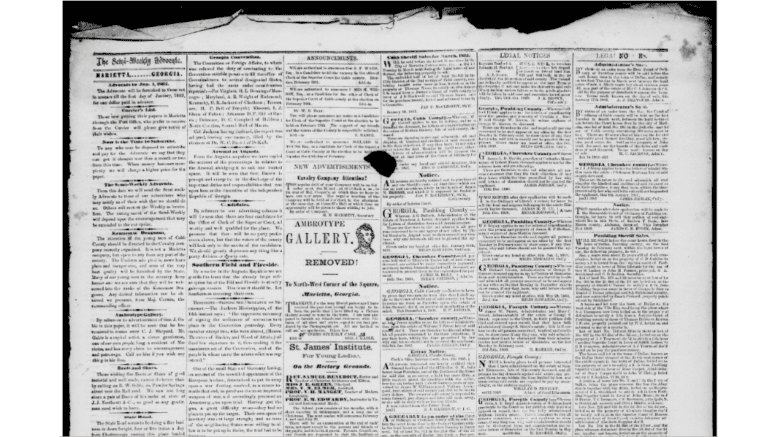If we consider the backlog in the Cobb County clerk’s office now scandalous, imagine reader reaction to this brief story from the February 1, 1861, issue of the Marietta Advocate:
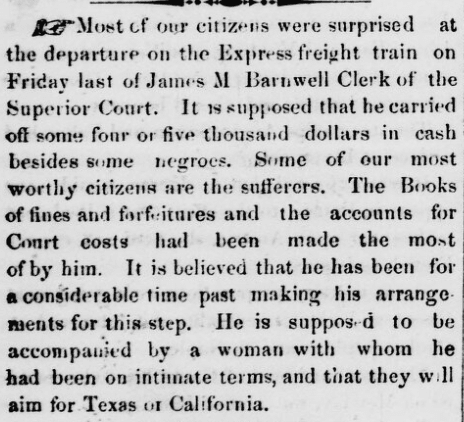
Most of our citizens were surprised at the departure on the Express freight train on Friday last of James M. Barnwell, Clerk of the Superior Court.
It is supposed that he carried off some four or five thousand dollars in cash, besides some negroes. Some of our most worthy citizens are the sufferers.
The books of fines and forfeitures and the accounts for court costs had been made the mode of by him. It is believed that he has been for a considerable time past making his arrangements for this step.
He is supposed to be accompanied by a woman with whom he had been on intimate terms, and that they will aim for Texas or California.
It isn’t stated whether the enslaved people who were taken with him were considered his property under the laws of the Confederacy enshrining human bondage, but one thing is certain. Four or five thousand dollars was a lot of money in 1861, even in soon-to-be-worthless Confederate cash.
There was a follow-up notice in the same edition of the Advocate warning residents not to purchase assets guaranteed by the cash Barnwell had stolen:
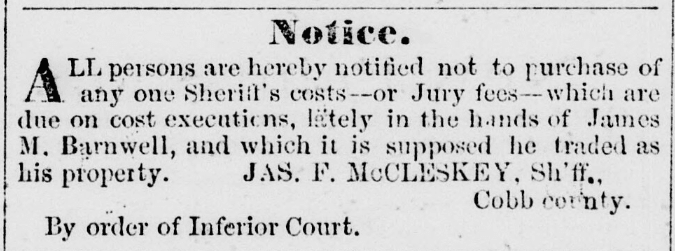
ALL persons are hereby notified not to purchase from anyone Sheriff’s costs or Jury fees which are due on cost executions, lately in the hands of James M. Barnwell, and which it is supposed he traded as his property.
In the February 12 edition of the Advocate, Barnwell’s Masonic Lodge got in on the action, calling him to appear
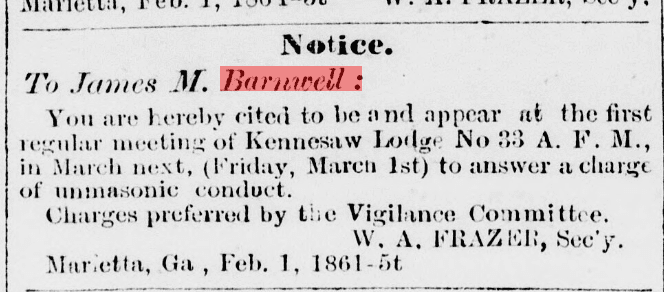
To James M. Barnwell:
You are hereby cited to be and appear at the first regular meeting of the Kennesaw Lodge No 33 A.F.M., in March next, (Friday, March 1st) to answer a charge of unmasonic conduct.
Charges preferred by the Vigilance Committee.
W.A. FRAZER, Sec’y.
Marietta, Ga, Feb 1, 1861 -5t
Barnwell’s name showed up again in the Advocate, but only because a legal notice regarding a divorce he had signed in his capacity as clerk was prepaid and scheduled to run on a schedule of once every month for four months:
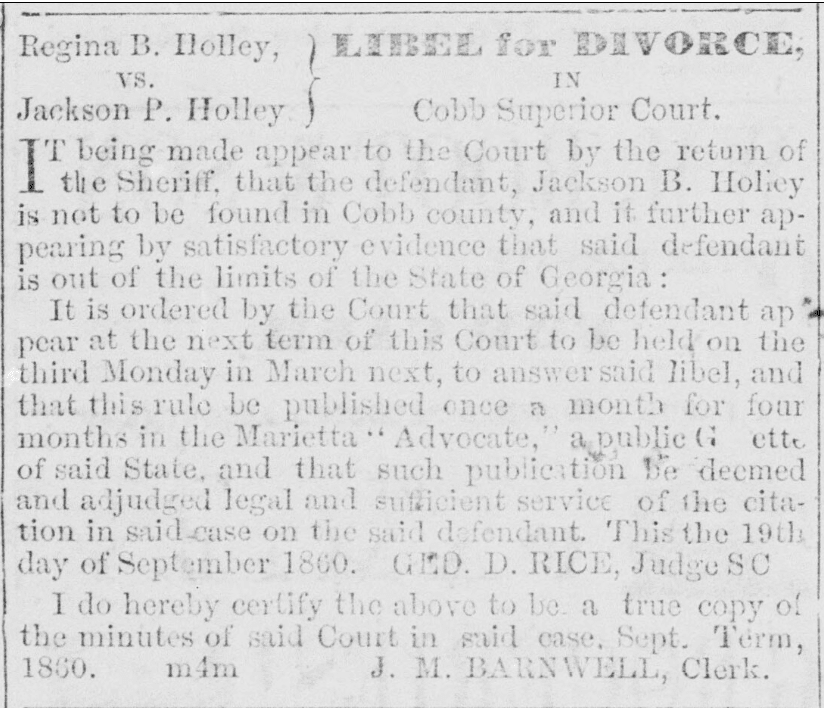
In the March 15 edition another mention of Barnwell is made in an article about the county’s finances:
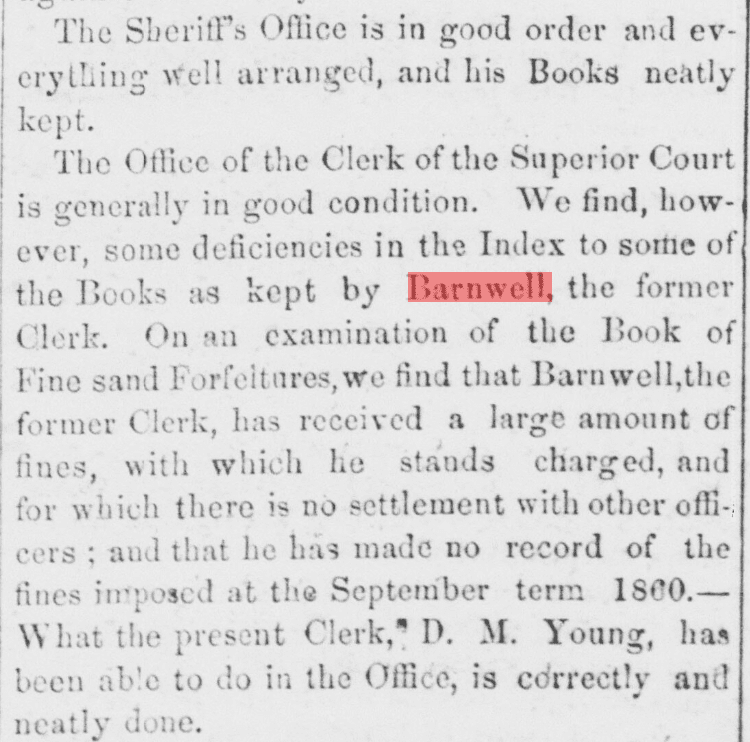
The Office of the Clerk of the Superior Court is gcnerallv in good condition. We find, how ever, some deficiencies in the Index to some of the Books as kept by Barnwell, the former Clerk. On an examination of the Book of Fines and Forfeitures, we find that Barnwell,the former Clerk, has received a large amount of fines, with which he stands charged, and for which there is no settlement with other officers ; and that he has made no record of the fines imposed at the September term 1860.— What the present Clerk,” D. M. Young, has been able to do in the Office, is correctly and neatly done.
After that, Barnwell disappeared from the pages of the Advocate. If Barnwell eluded authorities for the next two years there is a high probablity that he didn’t suffer consequences for this specific crime, since the Confederacy was coming unraveled by 1864, and local authorities had more things to worry about than a rogue court clerk.
About the Marietta Advocate
According to Georgia Historic Newspapers:
The Advocate is the oldest newspaper published in Marietta, having published only a month earlier than the second-oldest newspaper, Helicon. The two newspapers were political rivals, as Calder’s Advocate supported the Democratic Party and the Helicon aligned itself with the Whig Party. The near-simultaneous appearance of competing newspapers in Marietta coincides with an economic boom in the area, despite Atlanta becoming the Western and Atlantic Railroad hub over Marietta.
The Marietta Advocate was originally called the Cherokee Advocate by Calder, even though Cobb County had already been carved out of Cherokee County . Soon thereafter it became the Marietta Advocate.
The paper was forced to shut down when Sherman occupied the area around Atlanta.
When the war ended the Marietta Journal was founded by Raph McAlpin Goodman, a former editor of the Marietta Advocate who had left the Advocate because of his strong anti-secession views.
Digitized issues of the Marietta Advocate, the Marietta Helicon and early issues of the Marietta Journal (later the Marietta Daily Journal) can be found at the Georgia Historic Newspaper website, housed at the University of Georgia.

